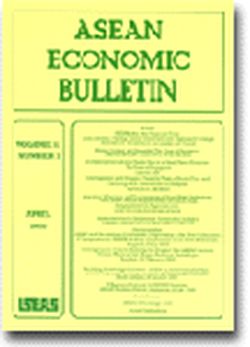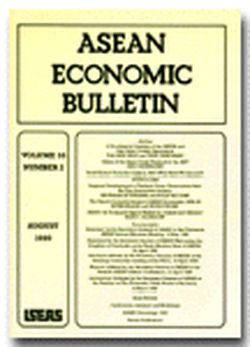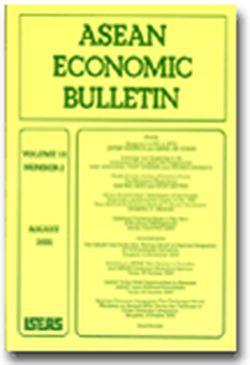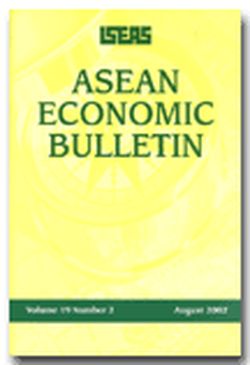ASEAN Economic Bulletin Vol. 18/3 (Dec 2001)
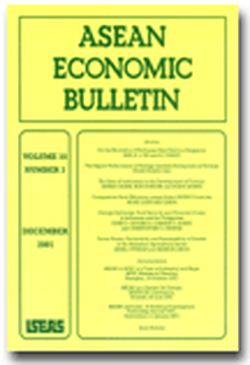
Date of publication:
December 2001
Number of pages:
112
Code:
AE18/3
Contents
-
Preliminary pages
- ARTICLES
-
On the Neutrality of Exchange Rate Policy in Singapore, by Paul S L Yip, R F Wang, authors see abstractThis article shows that there is no long-run trade-off between exchange rate appreciation and export competitiveness in Singapore. The policy implication is that Singapore can use exchange rate appreciation to contain its inflation without hindering its competitiveness in the long run. Nevertheless, sluggishness of price in the short run implies that there is a short-run trade-off between exchange rate changes and export competitiveness. As a result, Singapore can use exchange rate depreciation to offset the impact of adverse cyclical external demand shock, as it did during the 1985-86 recession and 1997-98 Asian financial crisis.
-
The Export Performance of Foreign-Invested Enterprises in Vietnam, by Pham Hoang Mai, author see abstractOver the 1988-98 period, large amounts of foreign direct investment (FDI) flowed into Vietnam. About half of this has been channeled into industries that Vietnam has comparative advantage in, and especially those which produce export products for the international market. The exports generated by foreign-invested enterprises have increased rapidly, and these enterprises have become an important factor behind the rapid export growth of Vietnam in recent years. However, the export performance of foreign-invested enterprises has depended on government policies, especially tax incentives and trade policies, as well as the home country from which the FDI is sourced.
-
The Role of Institutions in the Development of Vietnam, by Satish Chand, Ron Duncan, Doan Quang, authors see abstractThe process of comprehensive economic reforms that commenced in 1986 has several lessons to offer for future policy-making in Vietnam. This article argues that institutional strengthening is critical for the future prosperity of the country. Several propositions from the new institutional economics (NIE) literature are corroborated by recent evidence from Vietnam to recommend policy settings necessary for continued economic development. The recommendations include the establishment of well-defined property rights, including a clear and enforceable system of contracts; strengthening the planning and administrative capacity of provincial offices; and, improvements in law enforcement. These institutional reforms must be given the highest priority if growth is to be revived and sustained over the medium to long term.
-
Comparative Bank Efficiency across Select ASEAN Countries, by Mohd Zaini Abd Karim, author see abstractBank efficiency becomes critically important in an environment of increasingly contestable international markets. As such, information regarding the efficiency of banks in a particular country as compared with their counterparts in other countries is important, as it enables policy-makers to make better decisions regarding the direction of their banking industry. Hence, by using a stochastic cost frontier approach, this study investigates whether there are significant differences in bank efficiency across select countries in the ASEAN region (Indonesia, Malaysia, the Philippines, and Thailand). The results indicate that there are significant differences. The results also show that, on average, ASEAN banks enjoy increasing returns to scale. Although scale economies for ASEAN banks decrease with asset sizes, larger banks tend to have higher cost efficiency than smaller banks. These results support the policy of banking sector consolidation in the ASEAN countries.
-
Foreign Exchange, Food Security, and Financial Crises in Indonesia and the Philippines, by Chris D Gingrich, Carmen D Horst, Christopher O Umidha, authors see abstractA model of foreign exchange supplies and food security is applied to Indonesia and the Philippines. The cost of food security imports compared with available foreign currency have affected aggregate cereal supplies in both countries over the last twenty years. In addition, Indonesia's decline in cereal supplies during the financial crisis of 1997-98 exceeded that predicted by a foreign currency shortage. The evidence suggests that short-run food security in food-importing countries is greatly affected by the interaction between foreign currency supplies, food import prices, and domestic food production. Compensatory financing programmes for food security should be responsive to future episodes of financial contagion, price increases, or production shocks.
-
Factor Shares, Productivity, and Sustainability of Growth in the Malaysian Agricultural Sector, by Jamal Othman, Mansor Jusoh, authors see abstractThis study examines the structure of the Malaysian agricultural production function over a thirty-seven-year period (1960-96). In particular, this study analyses how the shares of factors and total factor productivity to agricultural growth change over time, using the Cooley-Prescott (C-P) time-varying parameter (TVP) model. The relative magnitudes of the permanent and temporary portions of the time-varying parameter vectors, and changes in factor shares and input elasticities for Malaysian agriculture, are also examined over time. Policy implications on agricultural sustainability are offered.
- DOCUMENTATION
-
DOCUMENTATION: ASEAN in APEC at a Time of Adversity and Hope. Statement by H.E. Rodolfo C. Severino, Secretary-General of the Association of Southeast Asian Nations, at the APEC Ministerial Meeting, Shanghai, 18 October 2001
-
DOCUMENTATION: ASEAN as a Partner for Europe. Address by H.E. Rodolfo C. Severino, Secretary-General of the Association of Southeast Asian Nations, at the ASEAN-EU Conference, Brussels, 28 June 2001
-
DOCUMENTATION: ASEAN and India: A Growing Convergence. Address by H.E. Rodolfo C. Severino, Secretary-General of the Association of Southeast Asian Nations, at the Partnership Summit 2001, Hyderabad, 11 January 2001
- BOOK REVIEW
-
BOOK REVIEW: Southeast Asia: The Long Road Ahead, by Lim Chong Yah., by Robert L Curry, Jr., author
-
BOOK REVIEW: Tiger Technology: The Creation of A Semiconductor Industry in East Asia, by John A Mathews And Dong-Sung Cho., by Neil Saker, author
-
BOOK REVIEW: Corporate Strategies for Southeast Asia after the Crisis: A Comparison of Multinational Firms from Japan and Europe, edited by Jochen Legewie and Hendrik Meyer-Ohle., by Frank L Bartels, author
-
BOOK REVIEW: International Business: Emerging Issues and Emerging Markets, edited by Carla C. J. M. Millar, Robert M. Grant, and Chong Ju Choi., by Nick J Freeman, author
-
BOOK REVIEW: Reforming the International Financial System, Crisis Prevention and Response, edited by Jan Joost Teunissen., by Marie-Aimee Tourres, author
-
BOOK REVIEW: Looking Forward: Korea after the Economic Crisis, edited by Heather Smith., by Chung H Lee, author
-
BOOK REVIEW: The Japanese Business and Economic System: History and Prospects for the 21st Century, edited by Masao Nakamura., by Manabu Fujimura, author
-
BOOK REVIEW: Integrating Environmental Considerations into Economic Policy Making: Institutional Issues, by Economic and Social Commission for Asia and the Pacific., by Lee Poh Onn, author

